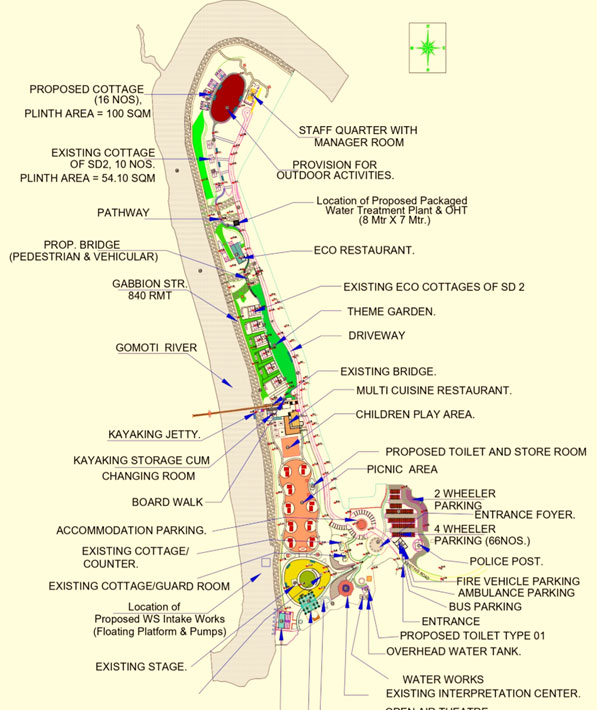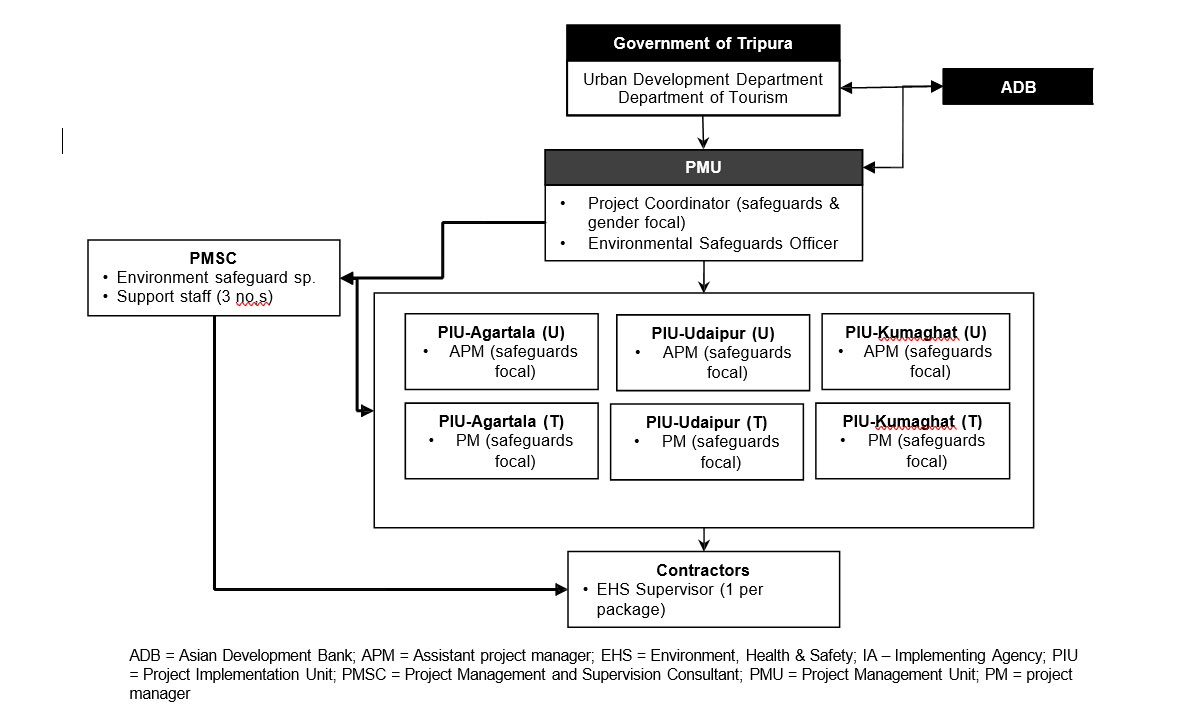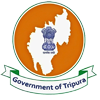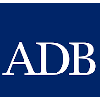
Master Plan
Social Safeguards
Involuntary Resettlement Screening and Categorization
The project has been categorized as category "B" for involuntary resettlement in accordance with the ADB's Safeguards Policy Statement (SPS), 2009. The project components do not cause land acquisition as the works will be carried out within the government-owned land and right-of-way. The land required for the construction of project components has been either transferred to the Urban Development Department (UDD) or the Department of Tourism (DOT), or necessary no objection certificates have been obtained from the respective departments. Permanent impact (loss of commercial structures) and temporary income loss is assessed. The affected persons with permanent impacts will be provided replacement shops within the same premises and resettlement assistance and allowances in line with the entitlement matrix. The project will compensate for temporary loss of income and other assistance before starting civil works.
Resettlement planning documents and due diligence reports
Tripura Urban Development Authority (TUDA) and Tripura Tourism Development Corporation Limited (TTDCL) have prepared five resettlement plans and four due diligence reports (DDR) following ADB's SPS 2009. Based on the final detailed designs and detailed measurement surveys, the project management unit (PMU) will ensure the safeguard documents are updated. The resettlement plans and DDRs will be disclosed on the ADB and project (TUDA and DOT) websites. The Government of Tripura (GOT) will bear the cost of resettlement and rehabilitation activities.
Indigenous peoples
The project has been categorized as category "B" for indigenous peoples in accordance with the ADB's SPS, 2009. The implementation of the project is not anticipated to cause any impact on indigenous peoples' dignity; human rights; livelihood systems; culture; ancestral domains; communal assets; and territorial, natural, and cultural resources, nor any negative impacts on the natural habitat, customary cultural aspects, and economic, social, or political institutions. However, positive impacts are expected on the indigenous peoples due to affirmative action increasing access to better water supply and enhanced livelihood opportunities.

“Social Safeguard Implementation Chart”
Resettlement and Indigenous peoples plans and due diligence reports
TUDA has prepared two resettlement and indigenous people plans (RIPP) for water supply and road and drains components in cluster III-A following ADB's SPS, 2009. The RIPPs have been prepared as project implementation would have positive impacts on the indigenous peoples. The RIPPs include specific action plans for the inclusion of indigenous peoples in project benefits and their enhanced and meaningful participation. RIPPs will be updated on the basis of final detailed designs and detailed measurement surveys. All the safeguard documents will be disclosed on the ADB and project websites. If the impacts on indigenous peoples are not significant or generally positive, a “specific action” plan may be included in a due diligence report detailing required actions to address the indigenous peoples issues.
TUDA has prepared two resettlement and indigenous people plans (RIPP) for water supply and road and drains components in cluster III-A following ADB's SPS, 2009. The RIPPs have been prepared as project implementation would have positive impacts on the indigenous peoples. The RIPPs include specific action plans for the inclusion of indigenous peoples in project benefits and their enhanced and meaningful participation. RIPPs will be updated on the basis of final detailed designs and detailed measurement surveys. All the safeguard documents will be disclosed on the ADB and project websites. If the impacts on indigenous peoples are not significant or generally positive, a “specific action” plan may be included in a due diligence report detailing required actions to address the indigenous peoples issues.
Implementation Arrangements for Social Safeguards
Project Management Unit
Urban Development Department (UDD) and DOT, GOT will establish the combined PMU with an administrative secretary, UDD as the project director and administrative secretary, DOT as co-project director. The PMU will also include two additional project directors (one each for urban and tourism), a project coordinator (urban and tourism), and a deputy project coordinator (tourism) and will be supported by subject matter specialists (independent consultants).
Urban Development Department (UDD) and DOT, GOT will establish the combined PMU with an administrative secretary, UDD as the project director and administrative secretary, DOT as co-project director. The PMU will also include two additional project directors (one each for urban and tourism), a project coordinator (urban and tourism), and a deputy project coordinator (tourism) and will be supported by subject matter specialists (independent consultants).
The project coordinator at PMU will be the nodal officer for environmental, social safeguards and gender and will be responsible for ensuring compliance with ADB's Safeguards Policy Statement (SPS), 2009, during the project implementation, including the monitoring and reporting. A qualified and experienced independent consultant designated as social safeguards and gender officer will support the project coordinator.
Project implementation unit The project will establish six project implementation units (PIU) (one PIU for the roads/drains and water supply component) in the project towns of Agartala, Udaipur and Kumarghat. Each PIU will be headed by a project manager (executive/ assistant engineer) and supported by junior engineers. The project manager of each PIU will be responsible for ensuring compliance with the environmental, social safeguards and gender aspects of the project.
Project management and supervision Consultant The project will hire the services of PMSC to support PMU and PIU in the implementation and ensure compliance with the social safeguards requirements. PMSC will mobilize a social safeguards specialist (on an intermittent basis) and three safeguards support staff (on a full-time basis) who will be placed in each PIU town and responsible for both urban and tourism components.
ADB Safeguards Policy Statement (SPS), 2009 requires that adverse impacts of projects on the environment and people are avoided, and where not possible, should be minimized, mitigated, and/or compensated. ADB-financed projects must comply with its SPS, 2009, and with the borrower country’s environmental laws, including the international laws/conventions to which the country is a signatory. The environment safeguard requirements are to ensure the environmental soundness and sustainability of projects and support the integration of environmental considerations into the project decision-making process.
Environmental categorization TUTDP is classified as category B for environment per ADB SPS 2009 as it is unlikely to cause any significant adverse environmental impacts that are irreversible, diverse, or unprecedented. The project is expected to have short-term localized impacts during construction that are site-specific and can be minimized and/or mitigated to acceptable levels.
Environmental Assessment, Management Plans and Monitoring Reports Executing agency/PMU has prepared nine29 draft initial environmental examination (IEE) reports, and corresponding environmental management plans (EMPs), for the nine subprojects proposed under the loan in accordance with ADB SPS.
Draft IEEs have been disclosed on ADB and executing agency websites The IEEs including EMPs will form part of the bid and contract documents. Proposed tourism development subproject in Chabimura will require Tripura State Pollution Control Board’s the consent to establish (CTE) and consent to operate (CTE) prior to start of construction and operation respectively. This needs to be obtained prior to award of this works Contract. Executing agency will ensure that all statutory requirements are met timely, including those related for construction and to be obtained by the contractor. Executing agency will update all draft IEEs during detailed engineering design or design verification and submit to ADB for review, clearance and disclosure, prior to start of construction. Contractors are required to submit to executing agency the site- specific EMPs (SEMPs) s. No works can commence until updated IEE is cleared and disclosed by ADB, and until project-specific grievance redress mechanism is established, SEMP is approved and all pre-construction requirements, as specified in respective IEE and EMP, are implemented by executing agency. Executing agency will monitoring implementation and will submit environmental monitoring reports to ADB, semiannually during construction and annually during operation until project completion. Environmental monitoring reports will be disposed project/executing agency and ADB websites in compliance with SPS 2009 and Access to Information Policy 2018.
Environmental audit For subprojects involving facilities and/or business activities that already exist or are under construction, environmental audit including an on-site assessment to identify past or present concerns related to impacts on the environment will be undertaken. The objective of this environmental audit is to determine whether actions were in accordance with ADB’s safeguard principles and requirements for borrowers/clients, and to identify and plan appropriate measures to address outstanding compliance issues.
Occupational Health and Safety Executing ang implement agencies shall ensure that workers are provided with a safe and healthy working environment, considering risks inherent to the sector and specific classes of hazards in the project work areas, including physical, chemical, biological, and radiological hazards. Executing agency/PMU shall ensure to take steps to prevent accidents, injury, and disease arising from, associated with, or occurring during the course of work by (i) identifying and minimizing, so far as reasonably practicable, the causes of potential hazards to workers; (ii) providing preventive and protective measures, including modification, substitution, or elimination of hazardous conditions or substances; (iii) providing appropriate equipment to minimize risks and requiring and enforcing its use; (iv) training workers and providing them with appropriate incentives to use and comply with health and safety procedures and protective equipment; (v) documenting and reporting occupational accidents, diseases, and incidents; and (vi) having emergency prevention, preparedness, and response arrangements in place. Executing agency/PMU shall also adhere to necessary protocols in response to emerging infectious diseases such as the corona virus disease (COVID-19) consistent with the guidelines of relevant government health care agencies and the World Health Organization.
Community Health and Safety Executing and implementing agencies shall ensure to identify and assess the risks to, and potential impacts on, the safety of affected communities during the design, construction, operation, and decommissioning of the project, and will establish preventive measures and plans to address them in a manner commensurate with the identified risks and impacts.
Urban Development Department (UDD) of Government of Tripura (GOT) is the executing agency, and the implementing agencies are Tripura Urban Development Authority (TUDA, for urban component) and Tripura Tourism Development Corporation Limited (TTDCL, for tourism component). A Project Management Unit (PMU) will be established with the secretary, UDD as the project director and secretary, Department of Tourism (DOT), GOT, as co-project director. The PMU will also include two additional project directors (one each for urban and tourism), a project coordinator, and an additional project coordinator. Six project implementation units (PIUs) will be established to cover urban and tourism components separately and will be located at Agartala, Udaipur and Kumarghat. Project Management & Supervision Consultant (PMSC) will be engaged to assist PMU and the PIUs for project implementation of the project.
At PMU, the project coordinator at PMU will be the nodal officer for environmental, social safeguards and gender and will be responsible for ensuring compliance with ADB's Safeguards Policy Statement (SPS), 2009, during the project implementation, including the monitoring and reporting. PMU will engage a qualified and experienced consultant, designated as environmental safeguards officer (ESO), to support project coordinator in environmental safeguards tasks. Project manager or assistant project manager of PIU will be designated as safeguards focal in each PIU. PMSC team will include an Environmental Safeguards Specialist (ESS), and three support safeguards staff, located in PIUs, and will provide all necessary support and expert guidance to PMU and PIUs. Contractor will appoint an Environment, Health and Safety (EHS).
Project Management Unit (PMU) The PMU will be responsible for planning, management, coordination, supervision and progress monitoring. The PMU has the responsibility of fulfilling environmental requirements of the government and ensuring effective implementation of the environmental management provisions in the IEEs, EMPs and civil works contracts.
Project Implementation Units The PIUs will be responsible for the day-to-day activities of project implementation in the field and will have direct supervision of all contractors. PIUs will oversee and monitor the day-to-day progress and implementation including environmental safeguards
Project Management and Supervision Consultant The PMU and PIUs will be supported by PMSC’s Environmental specialist and three support environmental engineers.
Contractor The approved draft IEEs and EMPs are to be included in bidding and contract documents. The PMU and PIUs will ensure that bidding and contract documents include specific provisions requiring contractors to comply with: (i) all applicable laws and regulations relating to environment, health and safety; (ii) reinstate pathways, other local infrastructure, and agricultural land to at least to their pre-project condition upon the completion of construction; (iii) all applicable labor laws and core labor standards on (a) prohibition of child labor as defined in national legislation, international treaties for construction and maintenance activities;(b) equal pay for equal work of equal value regardless of gender, ethnicity, or caste; (c) no discrimination in respect of employment and occupation; (d) allow freedom of association and effectively recognize the right to collective bargaining, and (e) elimination of forced labor; and (iv) the requirement to disseminate information on sexually transmitted diseases, including HIV/AIDS, to employees and local communities surrounding the project sites. The contractor will be required to appoint a full- time Environment, Health and Safety (EHS) supervisor on-site to implement the EMP.
Project implementation unit The project will establish six project implementation units (PIU) (one PIU for the roads/drains and water supply component) in the project towns of Agartala, Udaipur and Kumarghat. Each PIU will be headed by a project manager (executive/ assistant engineer) and supported by junior engineers. The project manager of each PIU will be responsible for ensuring compliance with the environmental, social safeguards and gender aspects of the project.
Project management and supervision Consultant The project will hire the services of PMSC to support PMU and PIU in the implementation and ensure compliance with the social safeguards requirements. PMSC will mobilize a social safeguards specialist (on an intermittent basis) and three safeguards support staff (on a full-time basis) who will be placed in each PIU town and responsible for both urban and tourism components.
Environmental Safeguards
ADB Safeguards Policy Statement (SPS), 2009 requires that adverse impacts of projects on the environment and people are avoided, and where not possible, should be minimized, mitigated, and/or compensated. ADB-financed projects must comply with its SPS, 2009, and with the borrower country’s environmental laws, including the international laws/conventions to which the country is a signatory. The environment safeguard requirements are to ensure the environmental soundness and sustainability of projects and support the integration of environmental considerations into the project decision-making process.
Environmental categorization TUTDP is classified as category B for environment per ADB SPS 2009 as it is unlikely to cause any significant adverse environmental impacts that are irreversible, diverse, or unprecedented. The project is expected to have short-term localized impacts during construction that are site-specific and can be minimized and/or mitigated to acceptable levels.
Environmental Assessment, Management Plans and Monitoring Reports Executing agency/PMU has prepared nine29 draft initial environmental examination (IEE) reports, and corresponding environmental management plans (EMPs), for the nine subprojects proposed under the loan in accordance with ADB SPS.
Draft IEEs have been disclosed on ADB and executing agency websites The IEEs including EMPs will form part of the bid and contract documents. Proposed tourism development subproject in Chabimura will require Tripura State Pollution Control Board’s the consent to establish (CTE) and consent to operate (CTE) prior to start of construction and operation respectively. This needs to be obtained prior to award of this works Contract. Executing agency will ensure that all statutory requirements are met timely, including those related for construction and to be obtained by the contractor. Executing agency will update all draft IEEs during detailed engineering design or design verification and submit to ADB for review, clearance and disclosure, prior to start of construction. Contractors are required to submit to executing agency the site- specific EMPs (SEMPs) s. No works can commence until updated IEE is cleared and disclosed by ADB, and until project-specific grievance redress mechanism is established, SEMP is approved and all pre-construction requirements, as specified in respective IEE and EMP, are implemented by executing agency. Executing agency will monitoring implementation and will submit environmental monitoring reports to ADB, semiannually during construction and annually during operation until project completion. Environmental monitoring reports will be disposed project/executing agency and ADB websites in compliance with SPS 2009 and Access to Information Policy 2018.
Environmental audit For subprojects involving facilities and/or business activities that already exist or are under construction, environmental audit including an on-site assessment to identify past or present concerns related to impacts on the environment will be undertaken. The objective of this environmental audit is to determine whether actions were in accordance with ADB’s safeguard principles and requirements for borrowers/clients, and to identify and plan appropriate measures to address outstanding compliance issues.
Occupational Health and Safety Executing ang implement agencies shall ensure that workers are provided with a safe and healthy working environment, considering risks inherent to the sector and specific classes of hazards in the project work areas, including physical, chemical, biological, and radiological hazards. Executing agency/PMU shall ensure to take steps to prevent accidents, injury, and disease arising from, associated with, or occurring during the course of work by (i) identifying and minimizing, so far as reasonably practicable, the causes of potential hazards to workers; (ii) providing preventive and protective measures, including modification, substitution, or elimination of hazardous conditions or substances; (iii) providing appropriate equipment to minimize risks and requiring and enforcing its use; (iv) training workers and providing them with appropriate incentives to use and comply with health and safety procedures and protective equipment; (v) documenting and reporting occupational accidents, diseases, and incidents; and (vi) having emergency prevention, preparedness, and response arrangements in place. Executing agency/PMU shall also adhere to necessary protocols in response to emerging infectious diseases such as the corona virus disease (COVID-19) consistent with the guidelines of relevant government health care agencies and the World Health Organization.
Community Health and Safety Executing and implementing agencies shall ensure to identify and assess the risks to, and potential impacts on, the safety of affected communities during the design, construction, operation, and decommissioning of the project, and will establish preventive measures and plans to address them in a manner commensurate with the identified risks and impacts.
Environmental Safeguards Implementation Arrangements and Responsibilities
Urban Development Department (UDD) of Government of Tripura (GOT) is the executing agency, and the implementing agencies are Tripura Urban Development Authority (TUDA, for urban component) and Tripura Tourism Development Corporation Limited (TTDCL, for tourism component). A Project Management Unit (PMU) will be established with the secretary, UDD as the project director and secretary, Department of Tourism (DOT), GOT, as co-project director. The PMU will also include two additional project directors (one each for urban and tourism), a project coordinator, and an additional project coordinator. Six project implementation units (PIUs) will be established to cover urban and tourism components separately and will be located at Agartala, Udaipur and Kumarghat. Project Management & Supervision Consultant (PMSC) will be engaged to assist PMU and the PIUs for project implementation of the project.
At PMU, the project coordinator at PMU will be the nodal officer for environmental, social safeguards and gender and will be responsible for ensuring compliance with ADB's Safeguards Policy Statement (SPS), 2009, during the project implementation, including the monitoring and reporting. PMU will engage a qualified and experienced consultant, designated as environmental safeguards officer (ESO), to support project coordinator in environmental safeguards tasks. Project manager or assistant project manager of PIU will be designated as safeguards focal in each PIU. PMSC team will include an Environmental Safeguards Specialist (ESS), and three support safeguards staff, located in PIUs, and will provide all necessary support and expert guidance to PMU and PIUs. Contractor will appoint an Environment, Health and Safety (EHS).
Project Management Unit (PMU) The PMU will be responsible for planning, management, coordination, supervision and progress monitoring. The PMU has the responsibility of fulfilling environmental requirements of the government and ensuring effective implementation of the environmental management provisions in the IEEs, EMPs and civil works contracts.
Project Implementation Units The PIUs will be responsible for the day-to-day activities of project implementation in the field and will have direct supervision of all contractors. PIUs will oversee and monitor the day-to-day progress and implementation including environmental safeguards
Project Management and Supervision Consultant The PMU and PIUs will be supported by PMSC’s Environmental specialist and three support environmental engineers.
Contractor The approved draft IEEs and EMPs are to be included in bidding and contract documents. The PMU and PIUs will ensure that bidding and contract documents include specific provisions requiring contractors to comply with: (i) all applicable laws and regulations relating to environment, health and safety; (ii) reinstate pathways, other local infrastructure, and agricultural land to at least to their pre-project condition upon the completion of construction; (iii) all applicable labor laws and core labor standards on (a) prohibition of child labor as defined in national legislation, international treaties for construction and maintenance activities;(b) equal pay for equal work of equal value regardless of gender, ethnicity, or caste; (c) no discrimination in respect of employment and occupation; (d) allow freedom of association and effectively recognize the right to collective bargaining, and (e) elimination of forced labor; and (iv) the requirement to disseminate information on sexually transmitted diseases, including HIV/AIDS, to employees and local communities surrounding the project sites. The contractor will be required to appoint a full- time Environment, Health and Safety (EHS) supervisor on-site to implement the EMP.

Safeguards Implementation Arrangements



